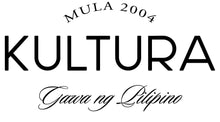From the streets of Liliw, Laguna to Kultura

They married young, with no source of income. To put food on the table, Nepthali Moneda started making abaca sandals with his bare hands —a trade he learned from his grandparents, who used to run a shoe stall in Liliw, Laguna. He would make about 24 pairs a day, which Elvie would sell at the pier.
That was in 1999. Today, this husband and wife tandem supplies abaca sandals to Kultura, SM’s specialty store for uniquely Filipino products. “Our big break came when Kultura started ordering from us. Marami kaming na abot na customers. Nakakatuwa talaga to see our abaca sandals in Kultura stores and online shops.
Success didn’t come easily or quickly. They sold at fairs and fiestas and were able to get a few orders. But still struggled to break even. “Ilang bagsak din kami ni Misis. Hindi siya tuloy-tuloy,” said Nepthali. But they learned from the setbacks, improved their products, and worked tirelessly in pursuit of their dream.
The turning point was in 2012, when they joined a trade fair organized by the Department of Trade and Industry. “Nakita kami ng Kultura sa trade fair, gusto daw nilang umorder.” They had the first meeting shortly after, and got a trial order of 900 pairs—larger than any of their previous orders.
That was just the beginning of their fruitful and long-lasting partnership with Kultura, which soon became their biggest local partner. The trial order of 900 pairs have now grown to annual orders that reach tens of thousands.
Nepthali and Elvie recall the challenges of adjusting to the new volume. “Dati, tali-tali lang ang delivery ng mga sinelas sa tindahan. Hindi kami sanay na mag-pack for several store branches, at mag barcode sa box and shoes.” However, it was a good problem to have, and Nepthali said that they learned a lot from Kulltura about how to professionalize their operations.

SM established Kultura to support local suppliers like Elvie and Nepthali to reach many Filipino consumers here and abroad, and connect them to the global market.
Platform for success
“Nung dumating ang Kultura we were able to hire more people,” said Elvie. From 10 workers, to now having 100, and they also improved their workshop and mini-office. The couple also shared that being a Kultura partner aided them in getting loans or negotiating contracts with other buyers. “Nakapag-expand na rin kami sa iba’t-ibang business.”
Nepthali and Elvie put a lot of thought and effort into creating beautiful, high-quality designs. Kultura helps their products get the attention and support they deserve through professional store displays, marketing campaigns, nationwide distribution, and access to international customers who order through their online store.

Footwear makers from Liliw, Laguna. According to Elvie, because of their partnership with Kultura they are able to provide livelihood to many people in their community.
Giving back to communities
For Elvie and Nepthali, it’s even more satisfying to know that their business is empowering others. They trained their neighbors to sew, so they now have regular work. They source materials from different communities: beadwork and pompoms from the Bagobo tribe, embroidery from Bohol, wooden beads from Cebu, crochet from Calamba, and Yakan weaves from Basilan and Zamboanga.

Ripple effect. From sourcing abaca fibers and indigenous weaves to the manufacturing process of shoemaking, every detail that goes into each pair represents communities, local enterprises, jobs, and opportunities.
Gateway to local and global markets all year long
According to Ivy Yap, Kultura Business Unit Head, SM established Kultura with the goal of supporting provincial suppliers of Filipino traditional and indigenous products. Kultura assists them by enhancing their products for today’s customers and serves as their market channel to Filipinos here and abroad and the global market.
Yap stated that SM and Kultura are passionate in encouraging Filipinos and the global community to support traditional and indigenous products to help sustain the livelihood of many provincial and regional suppliers. When customers purchase local products, they bring home a piece of Philippine culture, and also give back to the hardworking artisans, farmers, weavers, community enterprises, and indigenous peoples who create them.

The many hands behind the abaca sandals. When customers purchase local products, they bring home a piece of the Philippine culture and also give back to the hardworking communities that create them.
To learn more about uniquely Filipino products, visit the nearest Kultura branch in SM malls, the Kultura section in The SM Store, or their online store at www.kulturafilipino.com.

